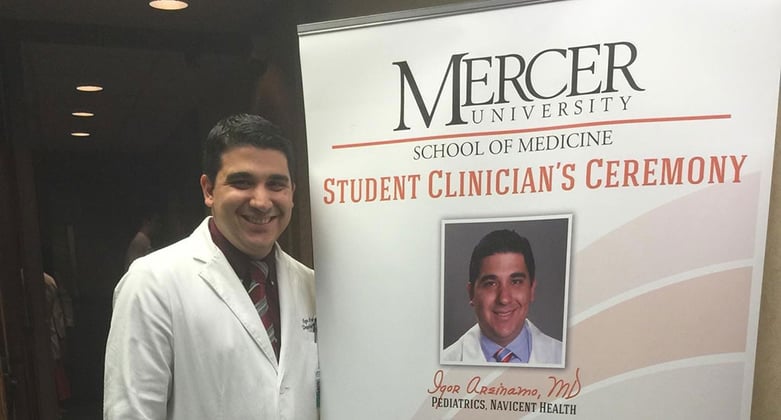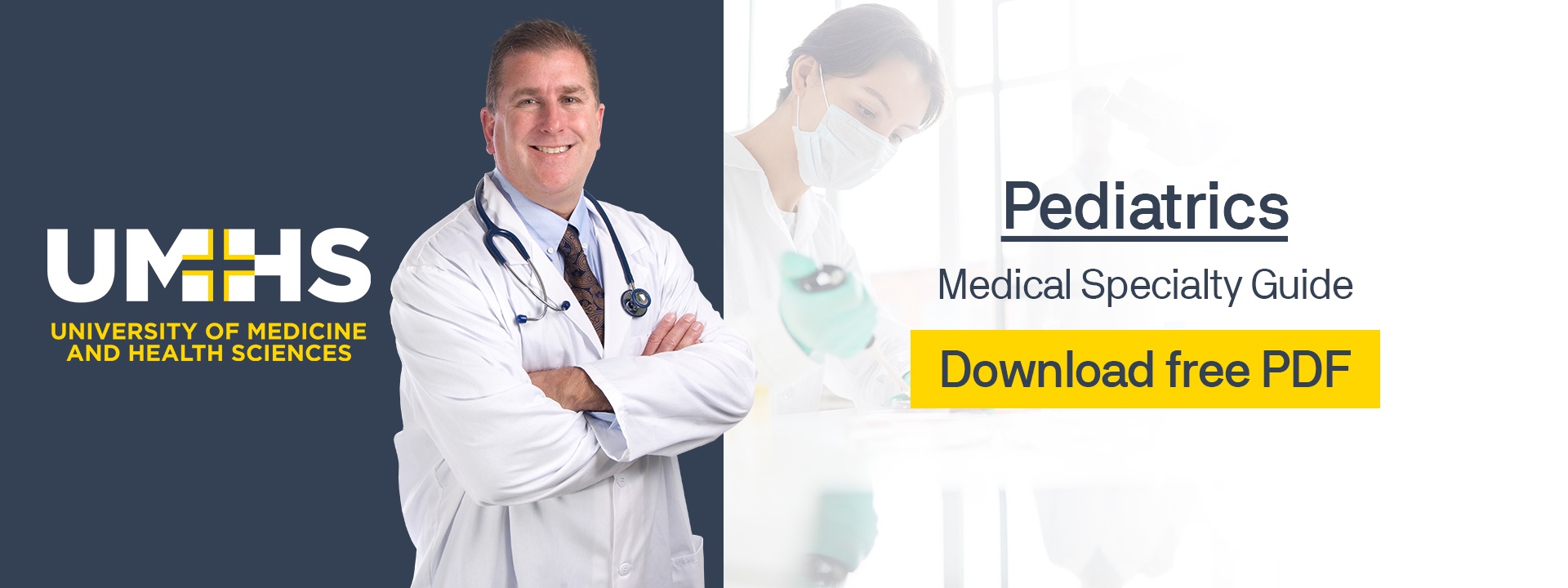2013 UMHS graduate Dr. Igor Areinamo is currently Chief Resident for the Pediatric Residency program at Mercer University in Macon, Georgia. Dr. Areinamo was part of the third class at UMHS. Originally from Venezuela, where he first completed three years of medical school at the Central University of Venezuela, Dr. Areinamo moved to the U.S. in 2004 and received a bachelors in psychology from Argosy University in Tampa, Florida. He first learned about UMHS at an information session in Orlando, hosted by the late Nancy Ross. Nancy helped persuade him to attend UMHS and Dr. Areinamo has worked hard to make it where he is today. He was one of only five IMGs (International Medical Graduates) to match into Pediatric Cardiology in 2015.
In a recent letter to UMHS President Warren Ross, Dr. Areinamo credited much of his success to what he learned about UMHS. “This is a major achievement not only for me but also for us as a medical school as I am extremely proud to represent UMHS wherever this career takes me,” he wrote. The married father of two has also matched into a Pediatric Cardiology Fellowship position at Primary Children’s Hospital in Salt Lake City, Utah. The UMHS Endeavour recently spoke to Dr. Areinamo about his studies at UMHS, his journey to become a doctor, the rewards and challenges of pediatric cardiology, the advantages and disadvantages of Caribbean medical schools, why UMHS gives a medical education that is “equally or even more rigorous” than schools on the mainland, his advice for current and future students about matching, and much more.
UMHS ENDEAVOUR: You were one of only five American IMGs to have matched into Pediatric Cardiology for 2015. Tell us about this.
DR. IGOR AREINAMO: Even before starting residency in pediatrics, I was always very interested in going into the pediatric cardiology field. I find this aspect of pediatrics to be very fascinating and fulfilling. During my first year of training, I further solidified my interest in this subspecialty and decided to apply for fellowship. I had people tell me that this particular subspecialty is very competitive especially if you graduated from a Caribbean medical school as there are only approximately 140 positions in the whole country and about 70% of the total applicant pool are actually able to secure a position every year. This particular fellowship application takes place during the second year of residency and it is to be appointed a year in advance. I was lucky enough to have several invitations for interviews at very good programs around the country. I am extremely happy to say that I was actually able to secure a position at my number one choice program, which was the University of Utah in Salt Lake City. This particular program has been rated as one of the top 20 in the country. After the match statistics were out, I realized that only five American IMGs had matched into pediatric cardiology for the 2016 appointment year and I have no words to describe how fortunate I am of being one of them. I strongly believe that hard work and good work ethics had a lot to do with my success but I have to say that my education and experience at UMHS gave me the tools to excel in my post-graduate training. I had great mentors during my time at UMHS that not only contributed with a good academic base but also taught me that everything is possible if we set our minds to it.
What are some of the most rewarding things about Pediatric Cardiology?
Pediatric Cardiology gives you the opportunity to make a difference in children’s lives from a very early stage. With new technology developments we are able to recognize congenital defects in utero and be prepared to act immediately in the neonatal period. In addition, I believe the pathophysiology and complexity of diseases make it a challenging yet very rewarding specialty.
Discover if a career in Pediatrics is right for you.
Learn why 83% of doctors would choose the same specialty again.
What about the challenges?
Many of the neonatal cardiac diagnoses represent a significant threat to the patient’s life expectancy and ability to live a normal life. Although nowadays there are many medical interventions used to ensure better prognosis, there are still many cases in which despite doing all we can do, the outcomes might not be as good as we would like. Cardiac diseases in pediatrics are a little more complicated than let’s say hypertension, which could be managed with lifestyle modifications and an anti-hypertensive medication. Pediatric patients with cardiac diseases usually have to undergo major surgeries, hospitalizations, doctor’s visits, as well as major lifestyle modifications which are hard to understand when they just want to be children and be able to do everything other kids their age do. Having to be a principal part of this and having to convey this reality to parents is by far the major challenge I find in this subspecialty.
What are some of your goals in Pediatric Cardiology?
After completing three years of fellowship in General Pediatric Cardiology, I would like to undergo an extra year of training in Interventional Cardiology. Once done with all of my training, I plan on joining a teaching hospital in which I would be able to teach training medical students and physicians. Teaching has always been another passion of mine and I would love to be able to incorporate it into my daily professional life.
Tell us why you initially decided to study at UMHS.
I still remember like it was yesterday when I received an invitation to an information session in Orlando, FL. I had the pleasure to interact with [the late] Ms. Nancy Ross who was more than great at exposing all the things UMHS had to offer. To be completely honest, being that I had immigrated from Venezuela, I was not very informed as to the differences between a Caribbean medical school and an American one. She took the time to explain what the main differences were and gave me a general background of why this institution had more to offer than other one out there. The fact that the school was managed by the Ross family gave me a huge sense of security. I then learned about how much President Ross had invested in making sure the campus had everything needed to be up to par or better than any other schools in the U.S. All of which gave an idea of how invested they were in making this Medical School a great one that would help me in achieving my goals.
Was there anything specific about your medical education at UMHS and clinical rotations that prepared you well for this area of medicine?
I am forever thankful to have been at UMHS at the time I was there. I cannot express how much I have been able to accomplish thanks to all I learned from the beyond great professors I had during my time in St. Kitts. I still have my lecture notes saved and have gone back to read them during my residency training to find essential basic science principles I am able to apply in pediatrics. Just to give a simple example, I still have Dr. Last’s lists of congenital diseases and their pathways which have come in very handy in my training as a pediatrician. During my clinical rotations, I had the opportunity to work with many amazing mentors who definitely had a great impact in shaping the physician I am today.
What advice do you have for current UMHS students, and medical students in general, about the match process?
My main advice is to dream big and work hard. Scores and grades are very important during the match process and you all should work hard to ensure that you perform to the best of your abilities. Another major part is how applicants conduct themselves during the interview process, and it is here where most Caribbean graduates are able to close the gap due to the stigma that comes with being an IMG. We work extra hard to score as high as we can in all Steps which truly helps, but we also go the extra mile to show how determined we are in achieving our goals and dreams and that has invaluable weight. Finally, we need to be able to realize our limitations. When it comes to the Match, it is important to research relevant aspects that make a candidate more attractive to certain specialties. If, for example, someone wants to go into a specialty in which research experience is very important and he/she has not had any experience in this field, it is then imperative that he/she dedicates significant time working on this aspect. Different programs have different emphasis when recruiting and reviewing current residents give a great view of what they might be looking for. I have heard many success stories but I have also heard of negative ones. The latest tend to be related with preventable mistakes which could have been picked up prior to submitting the application if more time and thought had been put into it. Do not take the Match lightly and get many people to review your personal statement and CV; this is where most people have issues.
What are some of the advantages and disadvantages for students at Caribbean medical schools regarding the Match process?
As I mentioned before, Caribbean grads tend to have to work extra hard to prove that they have much to offer. It is hard because although we might have the same or better scores than our U.S. grad counterparts we still have to demonstrate that we have what it takes simply because we decided to attend an offshore medical school. What many people don’t understand is that if you go to a reputable Caribbean medical school like UMHS, the education is many times equally or even more rigorous than institutions on the mainland. In order for us to be successful in medical school, we require much self determination, hard work, but most importantly it requires that we are willing to leave our comfortable lives and families all to be able to achieve our goals. That in my opinion is the strongest proof that we are willing to do anything to ensure that we are successful in reaching objectives.
(Top photo) DR. IGOR AREINAMO: The 2013 UMHS graduate was 1 of only 5 IMGs to have matched into Pediatric Cardiology in 2015. Photo: Courtesy of Dr. Areinamo
About UMHS:
Built in the tradition of the best US universities, the University of Medicine and Health Sciences focuses on individual student attention, maintaining small class sizes and recruiting high-quality faculty. We call this unique approach, “personalized medical education,” and it’s what has led to our unprecedented 96% student retention rate, and outstanding residency placements across the US and Canada. UMHS is challenging everything you thought you knew about Caribbean medical schools.

Scott is Director of Digital Content & Alumni Communications Liaison at UMHS and editor of the UMHS Endeavour blog. When he's not writing about UMHS students, faculty, events, public health, alumni and UMHS research, he writes and edits Broadway theater reviews for a website he publishes in New York City, StageZine.com.

















